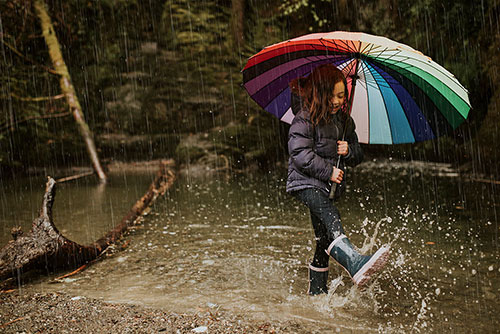Rain Rain Go Away, Little Johnny Wants to Play!
Monsoon weather is very pleasant but it is a time when children get sick. The downpour experienced throughout Tamil Nadu recently, makes one focus his/her attention on addressing the commonest diseases faced by children.

Mosquitoes
Monsoon breeds mosquitoes and makes children prone to malaria, chikungunya and dengue. These diseases are accompanied by high fever, rashes and muscle pain.
Contaminated Water and Food
Hepatitis, diarrhea, worm infestations and typhoid are the main diseases caused by contaminated water and food. They cause high fever, abdomen pain, jaundice and extreme lethargy. Leptospirosis is another fever prevalent in children who wade through the monsoon waters that are contaminated.
Moisture in Environment
Fungal infections are caused by poor hygiene and skin-to-skin contact.
Respiratory Infections
Bacterial or viral respiratory infections are prevalent during monsoon. It is accompanied by fever, cough, cold, breathing difficulty and poor feeding in children.
Allergies
Children are also prone to allergic symptoms in the form of a recurrent sneeze, allergic cough, headaches, rashes over the body or even episodes of wheezing.
This year with a pandemic adding to every one’s woes, it has become difficult to distinguish between a normal fever and that of COVID-19. The best way is to call on a pediatrician and follow his/her advice.
Prevention Is Always Better Than Cure!
Here are a few ways to keep children safe this monsoon season:
- Boiled and cooled water to drink
- Balanced nutritious diet – fruits, vegetables
- Vaccinations – flu, pneumonia, typhoid, hepatitis-A
- Hand and personal hygiene
- Periodic deworming of children
- Avoid outside food intake during monsoon
- Avoid taking your child out unnecessarily
- Mosquito bite prevention (mosquito bats, mosquito nets, repellants, keep child covered)
- Avoid water stagnation near homes
- Seek help early – see a doctor immediately if unwell

I would also like to highlight the importance of vaccination in this article.
Why is vaccination in children important?
When the baby is born, the immune system is not well-developed putting the child at the greatest risk of infections. There are a few infections which can only be prevented as there is no cure.
Vaccines + Body’s Natural Defence = Immunity to Disease
The benefits of vaccines always outweigh the side effects.
Did you know?
- Vaccination saves 3 million lives a year!
- Cases of polio were reduced by 99%. There are only three polio-endemic countries (Pakistan, Afghanistan and Nigeria) in the world
- UNICEF states if all children were vaccinated, 25 million lives would have been saved between 2011 and 2020
- Globally, measles death rate reduced by 75%
- No other intervention has as much impact as vaccination in reducing infection (not even antibiotics)
- Reduces hospitalization, days spent in sickness and protects future generations
In Kauvery Hospital, we maintain effectively a baby’s immunisation record, updated as per the latest guidelines as given by the Indian Academy of Pediatrics (as in the figure).
Why should we follow a schedule?
- Certain vaccines given at certain ages, work best!
(For example: BCG protects against tuberculosis right from birth.
- Polio vaccine is given between 0 to 5 years of age as this age group is at highest risk.)
- Protects not only the child but also the community and future generation
- Nowadays schools, day-care and even sports teams require proof of immunisation
COVID Vaccination in Children: To Give or Not?
COVID pandemic is still raging in other countries of the world. In India, we haven’t experienced the third wave of COVID-19 yet. With the festive months of November, December and January coming up, there is crowding in markets and malls. With every country having a different opinion on the next wave probability and vaccination, it is impossible to arrive at a consensus on when COVID will end. While COVID vaccination in children has been approved overseas, we are yet to vaccinate our children.
ICMR surveys after the second wave showed 67.4 percentage antibodies in children above 4 years. The COVID-19 infection in children that we have been witnessing in the last 2 years has been asymptomatic, mild or moderate. However, they are at risk of developing multi-organ inflammatory syndrome, post-recovery. Also, immunocompromised children are at more risk of developing a serious infection. Hence, it is important to keep all the children safe from the impact of COVID-19 infection and vaccination plays a key role in prevention.
Currently there are 2 vaccines for children as enlisted below. However, it is yet to be approved by the government.
ZyCov-D Vaccine
- Manufacturer: Zydus Cadila
- DNA-based vaccine
- The three-dose needle-free/painless vaccines
- Adolescents aged 12 years and above
Covaxin Vaccine
- Manufacturer: Bharat Biotech
- Inactivated vaccine
- Two dose vaccine
- 2 years and above
Priority for vaccination will be given to the vulnerable children (for example – cancer, congenital heart disease, chronic lung disease, chronic liver disease, chronic kidney diseases and transplant recipients)
Vaccination brings us closer to normalcy. However, when it comes to children, it is imperative to weigh the pros and cons before administration. Kauvery Hospital will always be at your service in the quest for your child’s protection!

Dr. Pushkala, M.S,
MBBS, MD (Pediatrics), PGDID (UNSW- Australia), PGPN (Boston)
Consultant Pediatrician
Kauvery Hospital, Chennai

